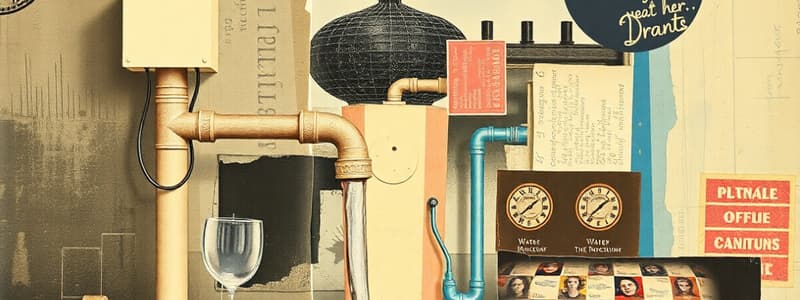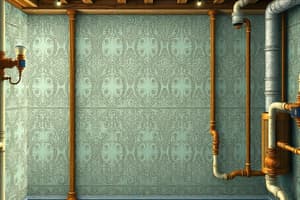Podcast
Questions and Answers
What is the primary purpose of ensuring adequate air circulation in drainage systems?
What is the primary purpose of ensuring adequate air circulation in drainage systems?
- To increase water flow velocity
- To prevent siphonage or aspiration (correct)
- To minimize energy consumption
- To reduce water temperature
What is required of vent terminals to ensure effective operation?
What is required of vent terminals to ensure effective operation?
- They should be equipped with automatic filters
- They must be installed to minimize clogging and foul air return (correct)
- They should extend only to the nearest wall
- They must be located below ground level
What type of maintenance should plumbing systems undergo?
What type of maintenance should plumbing systems undergo?
- Periodic remodeling
- Sanitary and serviceable maintenance (correct)
- Emergency repair services
- Regular aesthetic upgrades
What kind of substances are prohibited from entering the building drainage system?
What kind of substances are prohibited from entering the building drainage system?
Why is it important for fixtures to be installed in properly lighted and ventilated areas?
Why is it important for fixtures to be installed in properly lighted and ventilated areas?
How should building sewage be treated if there is no sewer system in reasonable proximity?
How should building sewage be treated if there is no sewer system in reasonable proximity?
What is the function of provisions made to prevent overflow in plumbing drainage systems?
What is the function of provisions made to prevent overflow in plumbing drainage systems?
What is the implication of plumbing fixtures needing to be installed with regard to accessibility?
What is the implication of plumbing fixtures needing to be installed with regard to accessibility?
According to the code of ethics, what is the policy regarding the use of a registered master plumber's license?
According to the code of ethics, what is the policy regarding the use of a registered master plumber's license?
What should a registered master plumber avoid in their professional conduct?
What should a registered master plumber avoid in their professional conduct?
What is required for premises intended for human habitation regarding water supply?
What is required for premises intended for human habitation regarding water supply?
How should plumbing be designed in relation to water usage?
How should plumbing be designed in relation to water usage?
What type of materials should plumbing fixtures be made from?
What type of materials should plumbing fixtures be made from?
What is necessary for a building with plumbing fixtures and a connection to public sewer?
What is necessary for a building with plumbing fixtures and a connection to public sewer?
In what manner should drainage systems be designed?
In what manner should drainage systems be designed?
What safety design feature is mandatory for fixtures connected to drainage systems?
What safety design feature is mandatory for fixtures connected to drainage systems?
What is a crucial consideration in the design of devices for heating and storing water?
What is a crucial consideration in the design of devices for heating and storing water?
Which plumbing design principle emphasizes sufficient water supply pressure?
Which plumbing design principle emphasizes sufficient water supply pressure?
What is the recommended minimum for sanitary facilities in family dwelling units?
What is the recommended minimum for sanitary facilities in family dwelling units?
What characteristic should the piping of the plumbing system have?
What characteristic should the piping of the plumbing system have?
Flashcards
Pure and Wholesome Water Supply
Pure and Wholesome Water Supply
All places intended for human use must have a safe water supply free from contamination
Sufficient Water Pressure and Volume
Sufficient Water Pressure and Volume
Plumbing fixtures need enough water pressure and volume to work correctly and quietly.
Water Conservation in Plumbing
Water Conservation in Plumbing
Plumbing should use the least amount of water while still working efficiently and being easy to clean
Preventing Explosions in Water Heating
Preventing Explosions in Water Heating
Signup and view all the flashcards
Connection to Public Sewer
Connection to Public Sewer
Signup and view all the flashcards
Minimum Plumbing Fixtures in Dwellings
Minimum Plumbing Fixtures in Dwellings
Signup and view all the flashcards
Non-absorbent Plumbing Fixtures
Non-absorbent Plumbing Fixtures
Signup and view all the flashcards
Preventing Clogging in Drainage Systems
Preventing Clogging in Drainage Systems
Signup and view all the flashcards
Durable Plumbing Materials
Durable Plumbing Materials
Signup and view all the flashcards
Water-seal Traps in Plumbing Fixtures
Water-seal Traps in Plumbing Fixtures
Signup and view all the flashcards
Siphonage
Siphonage
Signup and view all the flashcards
Vent Terminals
Vent Terminals
Signup and view all the flashcards
Plumbing System Tests
Plumbing System Tests
Signup and view all the flashcards
What Not to Put Down the Drain
What Not to Put Down the Drain
Signup and view all the flashcards
Food Contamination Prevention
Food Contamination Prevention
Signup and view all the flashcards
Toilet and Urinal Room Requirements
Toilet and Urinal Room Requirements
Signup and view all the flashcards
Sewage Disposal in the Absence of a Sewer
Sewage Disposal in the Absence of a Sewer
Signup and view all the flashcards
Backflow Prevention
Backflow Prevention
Signup and view all the flashcards
Maintenance of Plumbing System
Maintenance of Plumbing System
Signup and view all the flashcards
Accessible Plumbing Fixtures
Accessible Plumbing Fixtures
Signup and view all the flashcards
Study Notes
Plumbing Principles
- Pure Water Supply: All premises for human use must have a pure, wholesome water supply, not connected to unsafe sources or prone to backflow/back siphonage.
- Sufficient Volume and Pressure: Plumbing fixtures require adequate water volume and pressure for satisfactory and quiet operation under normal use.
- Water Conservation: Plumbing fixtures should be designed for minimal water use while maintaining performance and cleanliness.
- Preventing Explosions: Water heaters and storage systems should prevent overheating-related explosions.
- Building Sewer Connection: Buildings with plumbing fixtures abutting streets/alleys/easements needing a public sewer connection must have one.
- Basic Sanitary Facilities: Family dwellings and other structures need at least one water closet and one kitchen sink. Lavatories and baths/showers are also recommended.
- Non-Absorbent Materials: Smooth, non-absorbent materials are crucial for plumbing fixtures to avoid fouling.
- Drainage System Design: Drainage systems need to prevent fouling, solid deposits, and clogging. Adequate clean-out points are essential.
- Durable, Approved Piping: Plumbing pipes must be durable, well-made, and NAMPAP-approved to last.
- Water-Seal Traps: All fixtures connected to the drainage system require water-seal traps.
- Air Circulation & Siphonage Prevention: Air circulation in drainage pipes must be sufficient to prevent siphonage and trap seal issues.
- Ventilation: Ventilation terminals must extend outdoors to minimize clogging and prevent foul air entry.
- Testing: Plumbing systems require thorough leak and defect testing.
- Prohibited Substances: Materials that clog pipes, produce explosions, or damage pipes/joints are disallowed.
- Food/Water Contamination Prevention: Measures are needed to prevent food and water contamination from backflow. Connect fixtures indirectly if needed.
- Lighting and Ventilation: Water closets and urinals must have appropriate lighting and ventilation.
- Sewage Disposal: Buildings without nearby sewers require a proper sewage treatment and disposal system.
- Backflow Prevention: Adequate measures need to prevent sewer backflow in buildings.
- Sanitary and Serviceable Condition: Plumbing systems must be kept in a sanitary and serviceable condition.
- Accessibility: Fixtures must be installed with reasonable spacing for accessibility.
- Structural Integrity: Plumbing installation must not compromise building structural integrity or damage walls.
- Wastewater Treatment: Sewage and other potentially harmful wastes must be adequately treated before discharge into the environment.
Master Plumber Code of Ethics
- Professional Conduct: Registered Master Plumbers must maintain professional conduct.
- Fair Remuneration: Plumbers can't ask for more than originally agreed-upon charges (unless for extra services).
- Avoiding Taking Over Completed Contracts: Do not take jobs from another registered plumber who is already contracted.
- Fair Pricing: Plumbers can't underbid competitors by reducing fees after being offered.
- Unfair Government Advantage: Plumbers can't use salaried government positions to unfairly compete with private plumbers.
- Licensed Contractor Supervision: Licensed plumbers can't let unlicensed plumbers perform work without direct supervision.
- Ethical Reviews: Avoid falsely or maliciously criticizing another plumber's work, unless the original contract has been officially cancelled and fees paid.
- Proper Advertising: Advertising should not be self-praising and should uphold the honour of the profession.
Studying That Suits You
Use AI to generate personalized quizzes and flashcards to suit your learning preferences.




